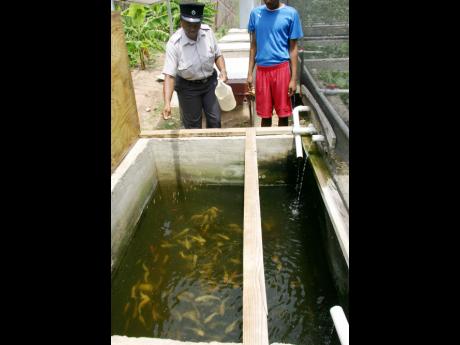Metcalf Street Juvenile Centre nurturing mind and body
As farmers across the island struggle to cope with the impact of a devastating drought, in the heart of Denham Town, Kingston, a project to enrich the minds and bodies of at-risk youth is taking root. There at the Metcalf Street Juvenile Secure Centre the investment in an aquaponics food production system is generating interest and excitement among officers and wards alike, as they buy into the science of this climate-smart closed-growing system.
Aquaponics is a food production system that combines aspects of conventional aquaculture (in this case tilapia rearing) with hydroponics, which involves the cultivation of plants in nutrient solutions with or without an inert medium (as soil) to provide mechanical support. And judging from the pak choi, lettuce and okra I saw thriving in beds of gravel, assistant superintendent Sabrina Shepherd Holness has every right to be proud, and for a number of reasons.
Since January, a total of 97 dozen okras, 109 pounds of pak choi, as well as 30 pounds of tilapia have been harvested, most of which was used in the kitchen, with the rest sold to staff at concession rates.
The choice of crops is dictated by the closed-growing system which sees the water (rich in nitrates as a result of the fish waste) in which the tilapia are raised, being piped to the vegetables, which uses up the nitrates before the water is piped back to the fish tanks, as agricultural instructor Tasshei Mitchell explained.
"As you can see in this case, the plants are growing in gravel. However the gravel is not what provides the plants with nutrients. It's really the nitrates from the fish waste, the water from the fish tank that's what really supplies the nutrients for the plants - leafy vegetables that require high nitrate levels, callaloo, lettuce, pack choi, okra, not cabbage so much," she told The Gleaner.
The roots of the vegetables filter out the nitrate and other waste matter, absorbing these as nutrients, with the resulting 'clean' water then channel back to the fish tanks, which are deliberately positioned at lower elevations. This symbiotic system is powered by a solar pump which drives the water from the tanks up through the piping, resulting in a fully contained, sustainable and economically feasible system. According to Mitchell, it uses 85-89 per cent less water than traditional open-field agriculture.
Therapeutic impact
That aside the growing interest by these wards of the state especially has more to do with new approach to crop farming, as well the therapeutic impact of their interaction with the fish, whether during feeding, selection or harvesting. For while open-field agriculture is still done at the Metcalf Street Juvenile Secure Centre, this project which was funded by the United States Agency for International Development (USAID) is consistent with the slogan of the implementing agency INMED Partnerships for Children - Healthy children, bright futures.
Assistant superintendent Shepherd Holness explained that the interest in agriculture shown by her charges, aged 12 years and upwards, prior to the project start-up late last year, is something of note.
"The boys are more than interested in coming to the farm. Before, it was normally the forking and doing the manual labour, but this is less labour-intensive in terms of preparing land and so on, and the boys, enjoy it," she disclosed. "Even for the fishes that are around the back, they consider it therapeutic, they like coming around. It gives them a sense of calm feeling, so we encourage them going around and looking and so on, and it gets them a lot more interested."
However, the boys whose contact hours on the farm run from 9:30 a.m. to 11:30 a.m. and from 1:30 p.m. to sometimes 3:30 p.m. are not the only ones fascinated by this "new thing" according to Shepherd Holness.
"They are very interested in this new thing where you actually have plants growing from gravel; yes, even the officers themselves. I have officers who are so much more now interested in the entire thing. Worse with the dry season, they enjoy coming and seeing things grow and seeing how well-hydrated the plants are and so on, because of the constant water system," the assistant superintendent shared.
"We have a lot of persons coming in, too, that are interested in the project. Every three months, we have visitors coming in to see what it is like, so it has made Metcalf Street a topic of discussion based upon on what is happening here."
Staff members excited
With the project showing such vast potential during this learning curve, staff members at the Metcalf Street Juvenile Secure Centre are really excited at how more could be achieved when things really get going. In fact, talks are under way between INMED and Department of Corrections executives, which could see the addition of another grow bed, as well as an additional air pump to facilitate expansion of the fish farm.
Meanwhile, Hyacinth Symes, operations manager at INMED, is particularly pleased with this project, exposing, as it does, young minds, to aquaponics as a feasible climate smart intervention, utilising renewable energy and with the potential to scale up the operations.
Such projects are among the innovative solutions INMED is looking to promote at its international symposium titled Harvest the Future which is set for Montego Bay from Sunday, June 14-Wednesday, June 17, where it will showcase practical small-scale options in the drive to achieve food security and nutrition at the national level. To this end, it will seek to inform and engage small farmers, fisherfolk, youth groups, women-led co-operatives and other groups.
To find out more, visit www.HarvestTheFuture.org.


